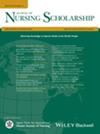Modifiable work stress factors and psychological health risk among nurses working within 13 countries
Abstract
Introduction
Nurses are identified as having higher work stress and poor mental health risk among health care workforce globally. It remains unclear which modifiable stress factors pose the greatest risk for poor psychological health among nursing workforce and needed to inform targeted practice and policy change.
To determine which occupation-related or personal stress factors precipitate higher risk for burnout, depression, anxiety, job satisfaction or intention to leave one's position among nurses globally.
Design
A cross-sectional anonymous survey was administered via email using a snowball recruitment strategy.
Methods
Academic researchers and clinical industry leaders across 3 global regions collaborated to generate an email listserv of professional nursing contacts for survey distribution. The survey included valid and reliable measures to scale stress factors (Work Stress Questionnaire), and screen for burnout (single item), depression (Patient Health Questionnaire-2), anxiety (Generalized Anxiety Disorder-2), resilience (Brief Resilience Scale) and intention to leave one's job (single item). We used logistic regression, first unadjusted and then adjusted for personal and professional characteristics, to determine associations between stress factors and psychological health risk.
Results
The final sample consisted of responses from 2864 nurses working across 13 countries. Most respondents reported working as a clinical nurse in the Philippines (n = 2275), United States (n = 424) and Saudi Arabia (n = 104). One third of nursing respondents endorsed high burnout and intention to leave their job. Those reporting work conflict had significantly higher odds of burnout (odds ratio 3.18; 95% CI 2.22–4.54) and three times more likely to screen positive for depression (odds ratio 3.02; 95% CI 1.36–6.72) and anxiety (odds ratio 2.92; 95% CI 1.57–5.43). Those endorsing difficulty sleeping were 15 times more likely to screen positive for depression (odds ratio 15.63; 95% CI 2.09–117.06). Lack of social support was significantly associated to higher risk for burnout, job dissatisfaction, depression, anxiety, and intention to leave one's position.
Conclusions
Nurses remain at risk for burnout and poor psychological health stemming from work stress. Factors such as clear workplace goals and assignments, increased engagement, good sleep health and social support may serve as protective factors against suboptimal psychological health, and in-turn poor workforce retention.
Clinical Relevance
Nurses reporting conflict in the workplace are three times more likely to screen positive for burnout, depression, and anxiety. Nurses reporting difficulty sleeping are 15 times more likely to screen positive for depression. Several modifiable factors can be targeted to reduce poor psychological health and high workforce turnover among nurses across countries.


 求助内容:
求助内容: 应助结果提醒方式:
应助结果提醒方式:


